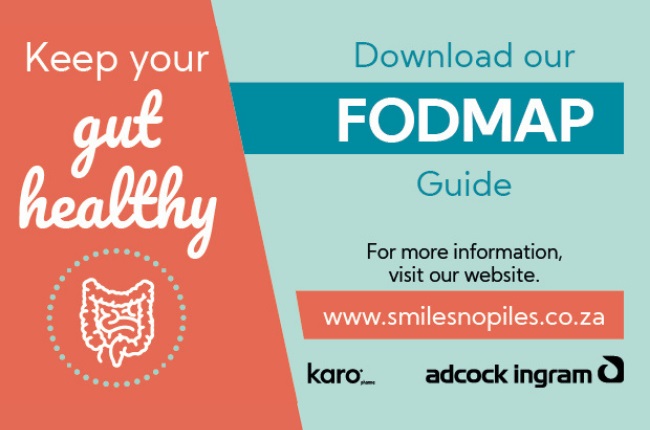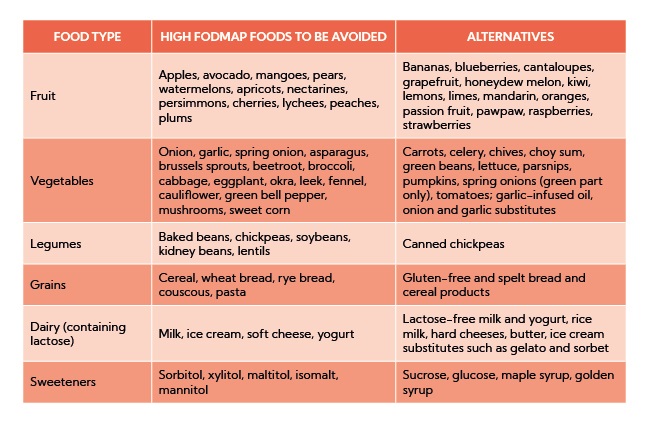
When one suffers from gastrointestinal symptoms such as constipation, diarrhoea, bloating or abdominal cramps often associated with conditions such as piles, irritable bowel syndrome (IBS) and inflammatory diseases (ulcerative colitis, coeliac disease and Crohn’s disease), the food you eat could have a significant impact on your health.1
Inflammatory bowel disease (IBD), encompassing both Crohn’s disease and ulcerative colitis (UC), is a chronic inflammatory intestinal disorder. A number of factors such as interactions between drugs and food, the location of the disease, symptoms and dietary restrictions can lead to protein energy malnutrition and specific nutritional deficiencies.2
Patients suffering from IBD should follow a normal, healthy diet as best as can be tolerated. But some patients may benefit from a tailored diet that is dictated by your food preferences and the symptoms experienced.2
(Image: Supplied)
FODMAP stands for Fermentable Oligosaccharides, Disaccharides, Monosaccharides and Polyols. FODMAPs are carbohydrates that do not fully absorb in the digestive tract and can irritate the bowels of people suffering from Crohn’s disease or IBS. The FODMAPs draw water into the intestines and get fermented by the gut bacteria to produce gas, bloating and a change in intestine movement.1,3,4
Foods that are regarded high FODMAP foods1,3,4
(Image: Supplied)
The low FODMAP diet requires a very drastic change, and is introduced in a 2-step approach:1,4
1. Elimination of high FODMAP foods over 6-8 weeks. Keep an eye on your symptoms and see if they improve.
2. Reintroduce high FODMAP foods gradually. Foods that have been excluded should be reintroduced into the diet gradually and the symptoms assessed.
The aim of this approach is to make sure you can still eat the maximum variety of foods as you can tolerate, with still controlling your symptoms.4
The low FODMAP diet has proven to reduce gastrointestinal symptoms such as abdominal pain, diarrhoea and bloating in conditions such as inflammatory bowel diseases and IBS and is recommended by the British Dietetic Association as part of IBS treatment.3-5
General dietary considerations for a healthy gut:2-6
- Eat smaller, frequent meals, and use of oral liquid
- supplements can also be used
- Reduce intake of fats and spices
- Reduce caffeine consumption
- Reduce alcohol consumption
- Avoid processed, junk food and carbonated drinks
Please visit our website for more information https://smilesnopiles.co.za/patient-resources/fodmap-diet-sheet/
References:
1. Diet Your Way to Health: Special Diets for Gastrointestinal Disorders. [Online] Gastrointestinal Specialist Inc. [Online]. Available from https://www.gastrova.com/article/special-diets-gastrointestinal-disorders/. Accessed 2020/02/26.
2. Eiden KA. Nutritional Considerations in Inflammatory Bowel Disease. Practical Gastroenterology, May 2003. Available from https://med.virginia.edu/ginutrition/wp-content/uploads/sites/199/2015/11/eidenarticle-May-03.pdf. Accessed 2020/02/23.
3. Catassi G, Lionetti E, Gatti S, Catassi C. The Low FODMAP diet: Many question marks for a catchy acronym. Nutrients. 2017;9(292):9 pages.
4. Dugum M, Barco K, Garg S. Managing irritable bowel syndrome: The low-FODMAP diet. Cleveland Clinic Journal of Medicine 2016;83(9):655-662.
5. Altobelli E, Del Negro VD, Angeletti PM, Latella G. Low-FODMAP Diet Improves Irritable Bowel Syndrome Symptoms: A Meta-Analysis.
6. Majeed S, Gohar F, Riaz M. Prevalence of inflammatory bowel disease and associated predisposing factors. International Journal of Applied Research 2018;4(2):208-211.
Under licence from Karo Pharma Stockholm, Sweden. For full prescribing information refer to the professional information approved by the medicines regulatory authority.
Adcock Ingram Limited. Reg. No. 1949/034385/06. Private Bag X69, Bryanston, 2021, South Africa. Telephone + 27 11 635 0000. www.adcock.com.
This post and content is content is sponsored, written and provided by Smiles No Piles.




 Publications
Publications
 Partners
Partners












